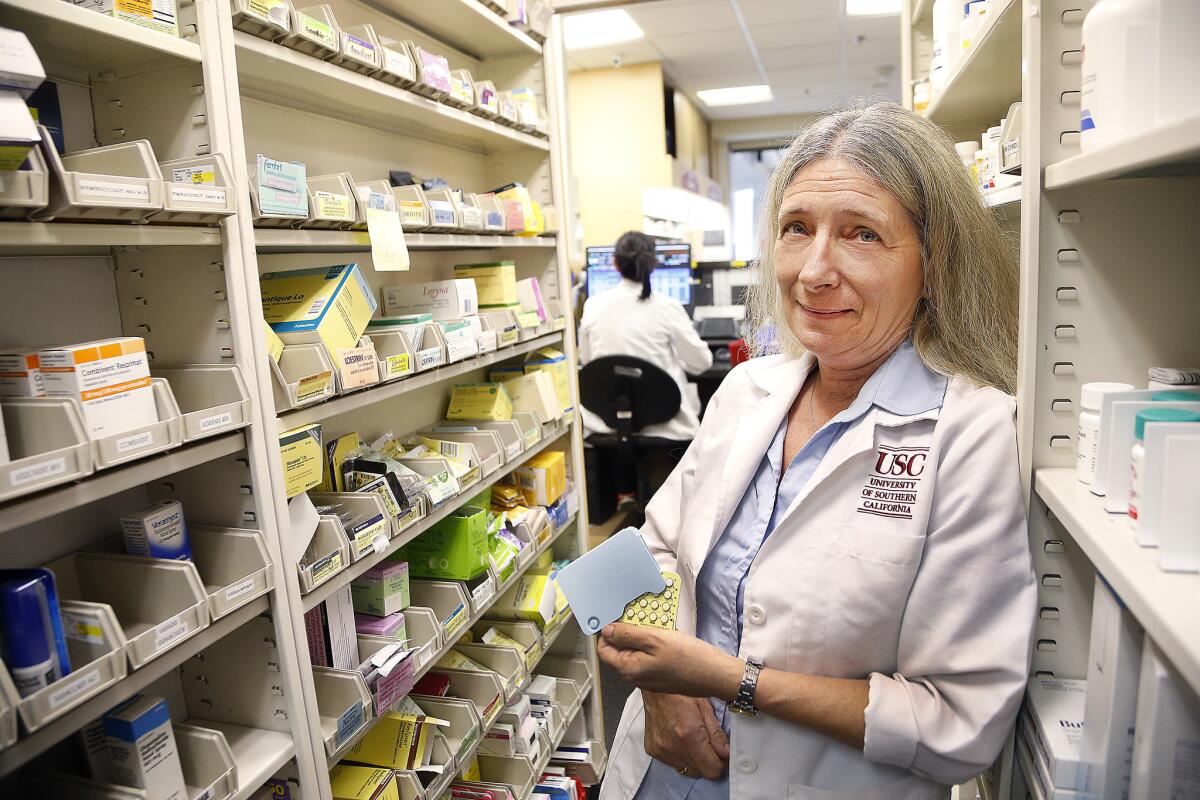Doubts remain as California allows girls and women to get more birth control without a prescription

Dr. Kathleen Besinque of the USC School of Pharmacy helped draft legislation allowing pharmacists to prescribe birth control. The measure took effect Friday.
- Share via
When her daughters were younger, Lori Herman wished there had been an easier way to get them birth control.
“It’s such a hassle to get the kid in to see the OB/GYN,” said Herman, a systems analyst who lives in Simi Valley.
Now there is. As of Friday, girls and women in California can pick up hormonal contraceptives, including pills and patches, at pharmacies without first visiting a doctor.
Supporters of the change say that requiring an annual doctor’s visit creates unnecessary barriers to contraception and that easing access could reduce unintended pregnancies.
But Herman, 50, said that both of her daughters experienced side effects, including headaches and nausea, when they first began taking birth control pills. She had to take them to the doctor repeatedly to get the problems diagnosed and find new contraceptives to try, she remembered.
If a pharmacist were handing out the medicines, she asked: “How would they deal with that?”
Many people are raising questions about the new system, in which females of any age in California no longer need a doctor’s prescription to get certain types of birth control. California becomes just the third state to allow women to obtain hormonal birth control directly from a pharmacist, though many more are currently considering similar legislation.
Dr. Deepjot Singh, head of the obstetrics and gynecology department at Torrance Memorial Medical Center, said approximately half of her patients who begin taking birth control must switch to another kind within the first year.
See more of our top stories on Facebook >>
When they come in complaining of unexpected bleeding, acne or weight gain, she must consider the effects of each drug and counsel the patient. Depending on the problem, she might even need to do a physical exam, she said.
“That’s a medical visit,” Singh said. “A pharmacist cannot replace a physician.”
She said she was worried that patients would miss out on important medical advice or lose the opportunity to have a problem diagnosed by a doctor if they instead relied on a pharmacist. She wants to make it easier for women to obtain birth control, she said, but would prefer if doctors initially helped patients find the best one for them, after which pharmacists could renew those prescriptions.
Supporters of California’s new law, however, say pharmacists have as much, if not more, knowledge of drug side effects as physicians do. When the law was debated in Sacramento, it faced little opposition.
Plus, pharmacists can and will refer women to doctors if there are questions they can’t answer, or they think patients require medical counseling, said USC clinical pharmacy professor Kathleen Besinque.
“The point isn’t that women have to go to a pharmacy, it’s just one more option,” said Besinque, who helped write the law.
Many public health advocates and doctors say that birth control is extremely safe and point to studies that show that women can generally choose one that works well for them. The American Congress of Obstetricians and Gynecologists, the largest group representing OB/GYNs, supports legislation that would make birth control truly over-the-counter.
In Oregon and Washington, pharmacists can already dispense birth control to women. Representatives from the Washington Medical Assn., which represents doctors, say the practice, which has been allowed for more than 30 years there, has caused no problems.
But in a recent poll of 2,500 American doctors conducted by SERMO, a social media site for physicians, 73% thought pharmacists shouldn’t be able to prescribe birth control to women.
“It’s just not a safe thing to put diagnosis and treatment and follow-up in the hands of a pharmacist,” said Dr. Donna Harrison, executive director of the American Assn. of Pro Life Obstetricians and Gynecologists, whose organization does not have an official stance on pharmacist-administered contraception. “It’s very foolish.”
Some physicians worried that patients currently on birth control would try to self-diagnose their problems on the Internet and choose a new kind based on nonscientific recommendations. Others were worried that women would start birth control to try to cure other problems -- it’s often used to treat acne, for example -- without consulting with a doctor first.
The California Medical Assn. opposed the state’s law originally but switched its stance to neutral after a provision was added requiring pharmacists to screen patients.
Before dispensing the hormones, pharmacists must take a patient’s blood pressure and administer a questionnaire covering medical issues that could raise red flags. High blood pressure increases the chance of strokes or blood clots. But Harrison said she thinks that California’s questionnaire won’t catch people who haven’t received medical care before and don’t know their medical risk factors.
Though California’s law officially took effect Friday, most pharmacies won’t be dispensing birth control over the next few days. They’re not required to participate under the law, and representatives from Safeway, Ralphs and CVS said they were either still preparing or waiting to review the final regulations.
Insurance companies should cover the cost of birth control picked up at pharmacies, though it’s possible that pharmacists could charge for furnishing the birth control. That service cannot be billed to insurance.
Virginia Herold, head of the state’s pharmacy board, said she thinks pharmacy chains will likely test out the service at a few locations initially.
“We don’t know what to expect, and neither do they,” she said.
Twitter: @skarlamangla
ALSO
Wheelman in epic L.A. car chase was trained to drive by the U.S. military
Higher levels of lead found in blood of children near Exide plant in Vernon
Man rescued from Morro Rock after marriage proposal is arrested on drug charges
More to Read
Sign up for Essential California
The most important California stories and recommendations in your inbox every morning.
You may occasionally receive promotional content from the Los Angeles Times.











